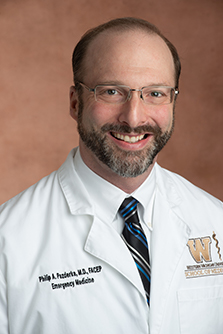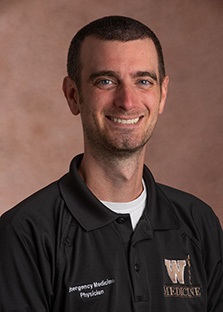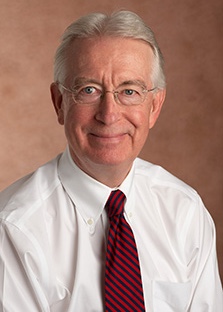
Program Director
Welcome from Program Leadership
Welcome to the Emergency Medicine Residency Program. Our residency:
- Combines the educational and clinical excellence of two leading tertiary care medical centers with the academics of Western Michigan University Homer Stryker M.D. School of Medicine.
- Is an ACGME-accredited, three-year program whose objective is to train excellent emergency clinicians in an educationally supportive environment. We afford sufficient curricular flexibility to enable physicians to enter any type of practice they desire. Upon completion, an individual will be eligible to sit for the American Board of Emergency Medicine's Qualifying Exam.
- Alumni are highly competent emergency clinicians with the ability to care for the sickest patients. Our curriculum focuses on critical care as well as EMS.
- Includes a large, well-qualified emergency medicine faculty dedicated to education and research.
- Has active pre-hospital care systems
- Includes a long-established air medical program that provides residents with hands-on experience in critical care transport. Offers an outstanding clinical experience, with over 160,000 patient visits.
- Includes a very strong ground Emergency Medical Services curriculum, featuring an innovative resident-staffed EMS response vehicle that is integrated into the county emergency response system with strong partnerships with dispatch, fire, police and EMS. Kalamazoo County 911 monitors and dispatches our physician response vehicles. Here is an example of a medical call to which we were dispatched (MSU-1 stands for Medical Support Unit-1 and is one of our physician response vehicles):

FAQs
- How can I schedule an audition rotation?
Visiting student audition rotations are an excellent way to get a taste of life at WMed. Visiting students are scheduled for a mixture of ED shifts, a teaching shift with an EM resident, an Ultrasound shift, and a ride-a-long on MSU-1, the resident physician response vehicle. Students also attend weekly lectures led by EM residents and weekly resident conferences and will be scheduled for a one-on-one advising appointment with a faculty advisor. The rotation ends with the NBME examination. To be considered for an audition rotation, you must apply through the VSLO Application Service.
- How do I apply to your residency program?
We participate in ResidencyCAS.
- What if I’m an osteopathic applicant?
We are pleased to receive applications from osteopathic applicants.
- How are your ED shifts scheduled?
Most ED shifts are eight hours in length. Depending on the level of training, residents are scheduled from 18-22 shifts per month. Residents are usually scheduled to have one weekend off per month and are usually scheduled for a maximum of five days in a row.
- What is your research requirement?
Residents are required to complete an academic research project during their training. Funds are available for travel to selected meetings for presentation of abstracts.
- How are Emergency Medicine conferences scheduled?
Participation in the didactic curriculum of the residency is an important part of emergency medicine education. We take a lot of pride in our conference series and feel strongly that our residents be allowed to participate. For this reason, attendance at conferences is considered mandatory other than for scheduled vacations, away electives, conferences, and the like. We accomplish this by scheduling all emergency medicine conferences as a block on Wednesdays and covering the emergency departments with faculty. At the start of the COVID-19 pandemic, our weekly conferences were transitioned to a virtual format. As restrictions have loosened, we have returned to mostly in-person didactics but do still have a few virtual conferences based on feedback from our residents.
- Is there money for residents to attend conferences?
Yes. We provide funding for our second- and third-year residents to attend an approved conference. Popular choices are the annual meetings of the American College of Emergency Physicians, the Society for Academic Emergency Medicine, and the Michigan College of Emergency Physicians.
First-year residents are provided $500 for professional development funds. PGY-2 and PGY-3 residents are given $1,500 for each year for professional development.



